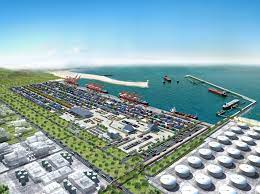By Joshua Yousouph
Maritime industry stakeholders have expressed divergent fears regarding the take-off of the Lekki Deep Seaport in September.

The stakeholders who spoke to Shipping Position Daily noted the negative impact the port is likely to have on the people, industry and nation’s economy at large.
Speaking with Shipping Position Daily last week, Engineer Bala Zakka; a petroleum engineer and public affairs analyst noted that without the presence of an effective rail system, vehicular transportation and commuting will be hectic in and out of the new port area. He said the conveyance of all cargoes out of Lagos to other coastal states should strictly be done via rail stating that Lagos is already choked up in terms of land transportation.
He noted that this will encourage the creation of Inland Dry Ports and Depots at coastal states for onward distribution of imported cargoes, adding that the Lekki Deep Seaport has a good strategic position being close to the Atlantic Ocean and also proximate to crude oil and other raw materials.
He said it will also be an opportunity to boost water transportation and develop logistic transportation modes in coastal states for upward movement and delivery into the hinterlands, which will, in turn, be used to supply products to other West African countries near the coast through Nigerian waters.
“What many of us expect is that all exit of products out of that zone should be by rail to locations outside Lagos state. There can be depots or Dry ports at other locations outside Lagos for onward distribution. This is the opportunity to make use of the coastal ports that are in Nigeria.
“On no account should vehicular or road transportation be used or considered as a positive alternative into Lagos and going out, because Lagos is already choked in terms of land transportation, but rather all products should be taken to the nearest location outside the entire Lagos state using rail lines.
“In other words, products will come, latch into the Nigerian waters and get across the coast of Nigeria to ports that are around Rivers, Bayelsa, Delta, and Akwa Ibom states. That will also be an opportunity to boost water or sea transportation and activities.
On his part, Captain Warredi Enuosoh noted that the type of activity the port will be involved in could require the communities within the vicinity to have a rethink by migrating away from that axis due to the unforeseeable pressure. He however advised that the port should start in phases.
“In that way, if they need to expand or remodel other areas from the lessons learnt, it would be easy to make the necessary adjustments. If you go full-blown at once with oil tankers and other types of vessels as well, it could pose an unprecedented challenge with a steep learning curve. This could cause difficulty in carrying out corrective actions’ he said.
Read Also: NIMASA FLOATING DOCK IDLE FOR 5 YEARS, STILL COUNTING
Speaking on the security of the port, Eniuosoh noted that it is not easy to protect such infrastructure. He said if there is a strict ISPs Code implementation and design concept that addresses all the possibilities right from the onset, the port will be impregnable.
Also speaking, a maritime expert, Captain Deji Abegunde opined that if the security aspect is well controlled and the projects are effectively managed, it will be a good turnaround for the nose-diving Nigeria economy. He noted that the Gulf of Guinea is becoming relatively safer under the current NIMASA administration. According to him, the Lekki deep seaport and Dangote refinery will definitely bail out Nigeria from her current predicaments of oil subsidies, high prices, and occasional fuel scarcity and also prevent the importation of adulterated petroleum products.
Also speaking, Deputy Vice President of the National Association of Government Approved Freight Forwarders (NAGAFF), Mr Segun Musa, said the corridors along Lekki –Epe axis that can be used as a passage for shipments that are not Lagos-bound and enroute Lagos-Ibadan Expressway. He also urged the government to begin to look at how it can begin to expand the port corridor to Badagry, by making it transport-friendly most especially by providing rail lines in those areas as well.
Kindly like us on Facebook















